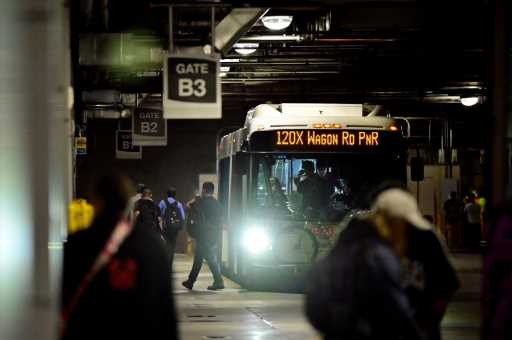Candidates for RTD’s Board of Directors largely agreed during an election forum Thursday that the transit agency must focus on solving its workforce shortages — while at the same time figuring out ways to raise serious money to pay for the future aspirations it recently charted out.
Much is at stake in those knotty challenges, from how quickly the Regional Transportation District can reverse some of its pandemic service cuts to how fully it can adapt to changing transit needs in coming decades.
“We’ve got to figure it out, and it’s going to be a tough conversation,” Michael Guzman, said about the prospect of raising billions of dollars in funding called for by RTD’s Mobility Plan for the Future, which looks ahead to 2050. He is a write-in candidate for District C in northwest Denver.
To expand transit service in meaningful ways, he said, RTD must begin that conversation with state legislators, metro residents and others to decide on a plan. Such a plan might rely on tax increases, new state funding, or both.
The forum at the Commons on Champa in downtown Denver was the only organized event for RTD candidates before the Nov. 8 election. This year offers an oddly sparse race — with little competition and just six ballot-qualified candidates, mostly incumbents, for the eight seats that are up. RTD’s 15-member board has staggered elections.
Four seats have drawn only write-in candidates; Guzman, a Starbucks shift supervisor, is among three who are all but guaranteed to win board positions because they’re the only ones registered to be counted in their district.
Thursday’s wide-ranging conversation, with five of the 11 RTD candidates participating, was moderated by former local TV meteorologist Marty Coniglio. It was organized by Bob Dinegar, a transit advocate who’s also a bus driver for an RTD contractor. He posted a recording of the nearly 90-minute forum online at TransitXchange.org.
The candidates weighed in on how to balance service offerings, ways to address safety problems, and whether to finish or reevaluate underfunded FasTracks projects. Nobody questioned that the agency faces major challenges as it comes out of the pandemic with roughly 40% lower ridership.
Several agreed that partnerships with cities and nonprofits to launch new services will be increasingly crucial. When it comes to RTD’s offerings, JoyAnn Keener-Ruscha, a northeast Denver policy analyst, wants to shift more routes from a hub-and-spoke configuration centered on downtown to grid patterns that connect more areas. Ian Harwick, a Denver city employee, argued for more frequent service on more bus routes.
“I understand the (financial) constraints, but I think that once we increase those services then we’ll see ridership follow,” he said.
Both are the sole write-in candidates in districts lacking ballot-qualified candidates — Keener-Ruscha in District B and Harwick in Arvada-based District L.
Director Lynn Guissinger, a Boulder resident representing District O, said RTD has a good multi-year plan to restore and adjust service, including in her area. Her challenger, Richard O’Keefe, didn’t participate in the forum.
“My hope is we can get the workforce built up to start bringing that service back,” Guissinger said.
Harvest Thomas III, a tax examiner for the Colorado Department of Revenue, said his workplace is one of many downtown that’s seen a big work-from-home shift. He keyed in on RTD’s staffing shortages, which persist in trades and operator positions despite a new union contract that boosted wages in March.
The agency could expand its pipeline and attract younger employees by teaching technical courses at local high schools, he suggested.
“Having been a school board member, I feel that you should tap into … the career technical education programs,” said Thomas, a Commerce City resident running in District K against incumbent Director Troy Whitmore, who didn’t participate in the forum.
Source: Read Full Article
-
Multiple Colorado schools temporarily placed under secure status due to threats
-
Nicholas Rossi CAN be extradited from Scotland to face charges in US
-
Dan Walker jokes about hiding his 'black eye and fat lip' with makeup
-
Solar panels WILL be installed on iconic King's College Chapel roof
-
6 cozy Colorado cocktails to keep you warm this holiday season


